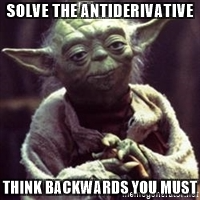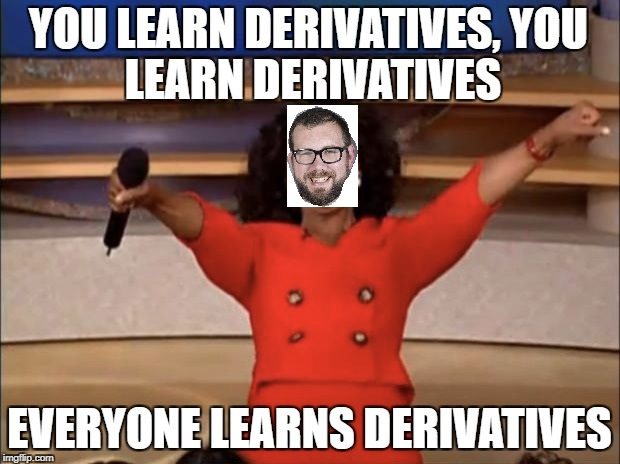Mathematical Memes: Fun and Insightful
By Andrew Penland, Western Carolina University
A meme was originally defined by Richard Dawkins as an idea that can be replicated. However, most people nowadays are familiar with the meme as a particular text-on-image Internet format, making a point through absurd or irreverent humor. Making and sharing memes is a popular pastime for some Internet users, including many of our increasingly hyperconnected students.
In Fall 2017, I decided to incorporate memes into my Calculus I courses. In my experience, one of the biggest obstacles to student success in Calculus I is buy-in: most students who are taking the course only do so as a requirement for their major (usually not Mathematics). Frustration with student disinterest is understandable, but rarely productive. I envisioned memes as a proactive way to involve students in co-creating a positive classroom culture.
How It Worked: Every other week during the semester, I would post Discussion Boards on our Learning Management System with various suggested topics. Posts would contribute to the Participation metric that counted as 10% towards their final grade. Every four weeks, posting a meme would be one valid way to participate in the Discussion Boards. Students typically had three or four other choices of things to post about to earn these points. My hope was to give students many different avenues for engagement with the class, as well as a feeling of authentic agency about their learning. The fact that memes were infrequent and voluntary was important: I did not want to privilege being especially hip or digitally literate, and some students preferred to think about their work more seriously. By definition, fun can't be mandatory.
Getting Started: For the first half of the class, most of the memes that students found and posted were negative about mathematics, painting the subject as useless (at best) and punitive (at worst). Still, they were humorous, and provided helpful information. Examples included “5 out of 4 people don't get jokes about fractions” and a “Professor Meme” where a straightforward homework question was contrasted with a convoluted and difficult exam question.
Seeing these was also helpful to me: the memes allowed students to be honest in a way that I don't think a more direct approach would have allowed. It provided a gentle, student-directed entry point into a discussion of topics like why the exam questions might seem so much harder than the homework. I believe that understanding their attitudes and using humor to deflect the intimidating nature of the subject helped create an atmosphere where students felt okay with acknowledging struggles and asking questions, without detracting from the rigor of the subject.
A Bridge to Problem-Solving: Seeing the memes helped me remember that many students, regardless of their previous instructors' best efforts, view mathematics as a purely symbolic and algorithmic toolkit. When their first assignment turned out to be Go find some memes, it served as a powerful pattern-interrupt. It immediately put them in an open-ended role of problem-solving and authorship, which was our ultimate goal, without needing to first address any preparation (such as algebra errors). The ability to laugh (including at oneself) is an important part of community-building.
Reflection: For the final meme-related assignment, I asked students to make original material related to our recent material on integration or the class as a whole.
Below are two of my favorite examples:
Meme by DJ Watkins
Meme by Zach Bailey
(Yes, that is my face on Oprah's body — my apologies.)
I felt that the activity had benefits that were difficult to quantify, but nonetheless tangible. While these examples are ridiculous (like most great memes), they also illustrated key concepts related to the class. These are very different from the types of thoughts I was seeing during the first part of the course. Moreover, to make jokes about the concepts, students had to be familiar with the concepts. It felt to me as if they were comfortable enough with mathematics to revel in the ability to make an inside joke. I have continued to use memes in my courses over the past four years, and they have evolved into a very valuable tool.
It's important to acknowledge that even five years ago, there is no way that I was the first person to use memes in this classroom context. The 2018 doctoral thesis of Gregory Benoit (see [1]), as well as more recent articles by Giulia Bini and Ornella Ributti( [2], [3], [4], [5] ) offer serious scholarly perspective to complement these personal anecdotes and inform future practice. I recall my direct influences in starting with this classroom technique were Patrick Bahls at The University of North Carolina Asheville, who has been giving creative digital mathematics assignments for over a decade, as well as the Mathematical Selfies project of my colleagues Axelle Faughn and Kathy Jaqua.
The idea that a mathematical meme (a certain type of Internet image) is itself a mathematical meme (in the broader sense of a replicable idea) makes me very happy. Here’s hoping that they continue to spread!
References
[1] Gregory Benoit. Mathematics in popular culture: An analysis of mathematical Internet memes. PhD thesis, Teachers College, Columbia University, 2018.
[2] Giulia Bini and Ornella Robutti. Meanings in mathematics: using internet memes and augmented reality to promote mathematical discourse. In Eleventh Congress of the European Society for Research in Mathematics Education, number 4. Freudenthal Group; Freudenthal Institute; ERME, 2019.
[3] Giulia Bini and Ornella Robutti. Thinking inside the post: Investigating the didactical use of mathematical internet memes. In PME & YANDEX, pages 101–108. International Group for the Psychology of Mathematics Education (PME), 2019.
[4] Giulia Bini and Ornella Robutti. Is this the real life? connecting mathematics across cultures. In CIEAEM 71, volume 7, pages 455–461, 2020.
[5] Giulia Bini, Ornella Robutti, and Angelika Bikner-Ahsbahs. Maths in the time of social media: conceptualizing the internet phenomenon of mathematical memes. International Journal of Mathematical Education in Science and Technology, pages 1–40, 2020.


